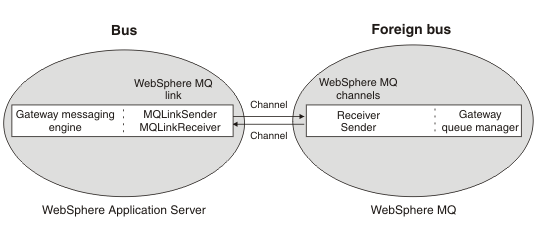Network Deployment (Distributed operating systems), v8.0 > Applications > Messaging resources > Interoperation with WebSphere MQ > Interoperation using a WebSphere MQ link
Point-to-point messaging with a WebSphere MQ network
The WebSphere MQ link, defined on a messaging engine in the service integration bus, describes the attributes required to connect to, and send or receive messages to or from, a WebSphere MQ queue manager or (for WebSphere MQ for z/OS ) queue sharing group that acts as a gateway to the WebSphere MQ network.
Point-to-point messaging might be:
- A request from WAS to WebSphere MQ, optionally followed by a WebSphere MQ reply.
- A request from a
WebSphere MQ network, optionally followed by a
WAS reply.
The following figure shows the flow of point-to-point messages across the WebSphere MQ link.
Figure 1. Exchanging messages between WebSphere MQ link sender and receiver channels, and a gateway queue manager with receiver and sender channels.

See Request-reply messaging through a WebSphere MQ link for more information about the reply messages transmitted across the WebSphere MQ link.
Point-to-point messaging might also include:
- A request from WAS through a WebSphere MQ network to another WAS, and a reply from that WAS, again through WebSphere MQ. For details of this two-stage messaging flow model, see Messaging between two application servers through WebSphere MQ.
- A request from a
WebSphere MQ network through a
WAS to another
WebSphere MQ network, and a reply from that
WebSphere MQ network, again through a
WAS. For details of this two-stage messaging flow model, see Messaging between two WebSphere MQ networks through an application server.
The following figure shows how messages can be exchanged between applications and messaging engines that are on the same bus, as well as between the WebSphere MQ link and queue managers connected to the gateway queue manager in the WebSphere MQ network.
Figure 2. Exchanging messages between messaging engines on a bus that has a WebSphere MQ link that is connected to a gateway queue manager on a foreign bus.

Notes:
- If your WAS application sends point-to-point messages to a WebSphere MQ application that is not JMS, such as a WebSphere MQ message-driven application in CICS (using the CICS MQ bridge) or IMS (using the IMS MQ bridge), then your WAS application has to use special techniques to ensure that the service integration messages (most likely JMS messages) are presented to the non-JMS application in a way that the application can understand. See Program for interoperation with WebSphere MQ , How service integration converts messages to and from WebSphere MQ format, and How to process WebSphere MQ message headers, which describes WAS helper classes that assist in the creation of suitable headers and body content.
- Some WebSphere MQ applications can process messages that include an MQRFH2 header (generally these are JMS or XMS or WebSphere MQ v7 applications) and some applications cannot do so (generally these are WebSphere MQ applications that predate the MQRFH2 header). We must set the destination context to inhibit adding an MQRFH2 header when messages are destined for a WebSphere MQ application that cannot handle this header. For information about setting the destination context, see Specify whether messages are forwarded to WebSphere MQ as JMS messages. The MQRFH2 header contains fields unique to the service integration bus. For details of these fields, see Map additional MQRFH2 header fields in service integration.
- Any WebSphere MQ queue name is also valid as a bus destination name and, as a general rule, you should configure a bus destination that is a WebSphere MQ queue to use the WebSphere MQ queue name. If your bus applications have to use a different name, you can achieve this by using an alias destination.
- WebSphere MQ channel or conversion exits (for example, for data conversion) are not supported by the WebSphere MQ link.
Message reliability levels - JMS delivery mode and service integration quality of service
Specify whether messages are forwarded to WebSphere MQ as JMS messages
Related
Map the message body to and from WebSphere MQ format
Map the message header fields and properties to and from WebSphere MQ format
Map additional MQRFH2 header fields in service integration
Map the JMS delivery option and message reliability to and from the WebSphere MQ persistence value
 Concept topic
Concept topic